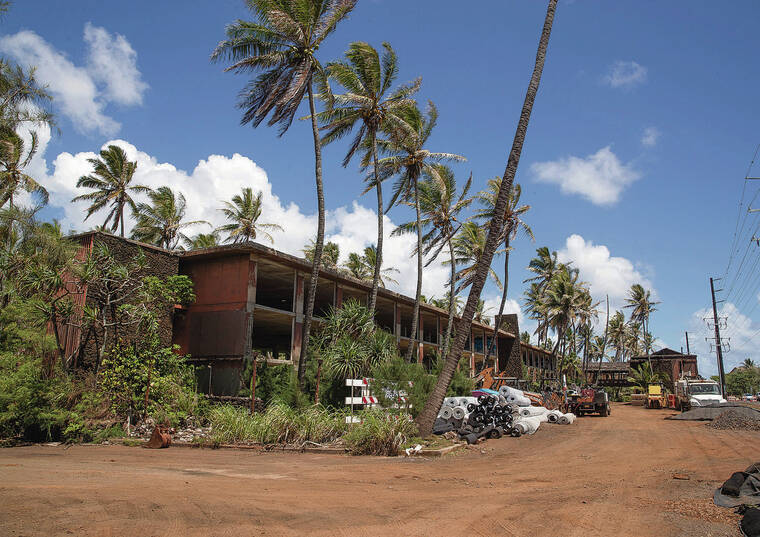Developers of the former Coco Palms Resort property aim to begin demolition work in the next couple of weeks to make way for a new 350-room hotel.
Contractors hired by the developers recently installed a dust barrier and cleared dead trees, overgrown brush and palm fronds from the property to prepare for demolition.
Managing partner Patrick Manning of Reef Capital Partners, parent company of subsidiary RP21 Coco Palms LLC, the fee owner of the property, said reconstruction is slated to take place in the summer and take three years to complete.
The project is estimated to cost $250 million, financed by a combination of equity and bank loans.
Reef Capital Partners, which served as the lender to the previous developer, Coco Palms Hui LLC, took over the property in 2018 after Coco Palms Hui defaulted on a loan. Manning said they intended to sell the property but changed their minds when Manning conducted extensive research on the land and discovered its rich history.
“I called my partners, and I said ‘This property is too important to sell,’” Manning said from Utah during a recent phone interview with the Honolulu Star-Advertiser.
Developers say they want to rebuild the property because they respect its history and importance. Something needs to be done or the property will be an eyesore and a hazard for another 30 years, Manning said.
Between the Coco Palms property and the state lease property, there’s about 50 acres, approximately 10 of which Reef Partners plan to redevelop.
Manning said he cares about the land and project and0 the opinions of community members.
“Even though we know there are many that don’t want it rebuilt, we intend to be viewed and earn a reputation for doing everything we can to honor its past and respect the people of Kauai and guests of Kauai and how we manage its future,” Manning said.
Coco Palms has remained shuttered since Hurricane Iniki walloped Kauai in 1992. Attempts by previous developers to rebuild the hotel were unsuccessful.
In addition to a new hotel, developers plan to add a cultural center on the land to tell its history.
Kauai’s last reigning queen, Deborah Kapule, wife of King Kaumualii, resided on the land in the mid-1800s. There are also fishponds and endangered species of nene and koloa, or Hawaiian duck.
Kauai County officials said developers have secured permits for demolition and reconstruction.
In an interview with the Star-Advertiser, Kauai Council Chairman Mel Rapozo said there was a time when the community wanted Coco Palms to be rebuilt, but the sentiment has since shifted. “They don’t want to see a resort built,” he added.
In October the state Board of Land and Natural Resources voted to renew annual revocable permits for three parcels of state public trust lands in Wailua.
The parcels make up less than an acre of the resort property that includes a parcel used for access and parking.
A state Board of Land and Natural Resources meeting was held Friday to address the current status of the revocable permits where members sought clarification on the current ownership of the Coco Palms property and assignments of the permits.
Chad DeCoursey with RP21 Coco Palms LLC, who attended Friday’s meeting via Zoom from Utah, said, “We want to be good stewards. … We have heard from the community that these buildings are a hazard, an eyesore, that they create all kinds of problems for the community. We’re trying to take care of that.”
Though board Chair Dawn Chang informed the public no action would be taken on the revocable permits, a stream of community members testified in opposition to the development.
Many emphasized iwi kupuna buried on the land.
Cultural practitioner Joseph Kekaulike Kamai choked up in tears as he testified before board members that his great-grandmother is buried there. “There is kupuna buried under the hotel, under the driveway and under the tennis courts,” he said.
“I really don’t want them to be digging anymore. I don’t want them grubbing our land,” Kamai said.
Former Kauai Council member and former state Sen. Gary Hooser said, “This property is incredibly sacred, and it’s been desecrated over and over again for the past 30 years.”
Hooser, a member of I Ola Wailuanui, a community organization that seeks to buy the property to restore the fishponds and build a cultural center, said, “Community stewardship of these lands deserve a chance.”

